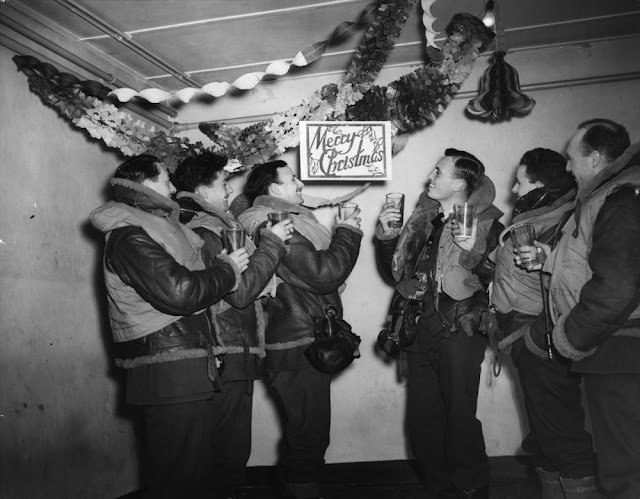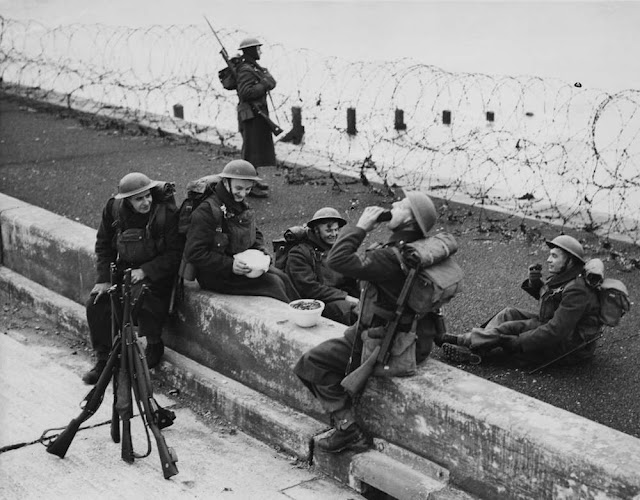Thursday 20 November 1941
 |
| The U.S. Secretary of State Cordell Hull with Ambassador Nomura and Special Envoy Kurusu on or about 20 November 1941. |
 |
| No 1 Squadron's CO, Squadron Leader James MacLachlan, in the cockpit of his Hurricane IIC at Tangmere, 20 November 1941. © IWM (CH 4014). |
 |
| Painting an unidentified corvette's stern at Liverpool on 20 November 1941. © IWM (A 6357). |
put conditions that would have assured Japan's domination of the Pacific, placing us in serious danger for decades to come.Hull goes even further in his memoirs, at least rhetorically, claiming that this Japanese proposal called for "virtually a surrender" by the United States.
 |
| "The officers and crew of HMS MONTGOMERY aboard the ship." This was taken on 20 November 1941 at Gourock. The Montgomery formerly was US destroyer USS Wickes, it was given to the Royal Navy pursuant to Lend-Lease. © IWM (A 6344). |
Even a temporary peace in the Pacific would permit us to complete defensive preparations in the Philippines and at the same time ensure continuance of material assistance to the British -- both of which are highly important.Despite indicating that the Japanese proposal is insufficient, Hull thus continues the negotiations even though the likelihood of some accommodation is very dim. Hull tasks Gerow, Stark, and their staffs to work up some more drafts of peace proposals over the next few days that might at least keep the negotiations going indefinitely. He promises Nomura that the U.S. will make a counterproposal.
 |
| General Kurt Briesen, commander of LII Army Corps, in Paris in front of the city commandant. He perishes on 20 November 1941 due to a Soviet aircraft attack (either bombing or strafing) near Isjum on the Seversky Donets River, southeast of Kharkiv. (Federal Archive Picture 146-2008-0358). |
Insofar as Japanese-American negotiations are concerned, in proceeding upon these negotiations for the adjustment of diplomatic relations on a just basis, conferences have been in progress since the 7th. However, there is a great disparity between their opinions and our own. In the light of the trend of past negotiations, there is considerable doubt as to whether a settlement of the negotiations will be reached. Insofar as we are concerned we have lent our maximum efforts in order to bring about a settlement of the negotiations. However, the situation not permitting any further conciliation by us, an optimistic view of the future is not permitted. In the event that negotiations are broken off, we expect that the situation in which Japan will find herself will be extremely critical. The above is for your information alone.Given the rejection of Proposal B by Hull, the Japanese government begins battening down for a likely conflict. All communications are cut with Iturup in the Kuril Islands because of the presence there of the Imperial Japanese Navy carrier fleet which is assembling in Tankan Bay for the attack on Pearl Harbor. The government also makes a number of administrative changes that reflect the need to shift the government to a war posture. These include upgrading Ryojun Military Port (Port Arthur) and the naval base at Mako in the Pescadores Islands to the status of Guard Districts.
 |
| Police booking photo of Iris Eileen Mary Webber dated 20 November 1941. Webber, a petty thief and "grog seller" earns the title "The most violent woman in Sydney" by carrying a "knuckleduster" to mug people. She physically attacked men who competed with her, including some notorious toughs of the day. The men often dropped the charges and claimed that a man had attacked them. This photo was probably taken after she was arrested for selling beer out of her home in Woolloomooloo. Or, it could have been for assaulting a man named Jackie Holder with a tomahawk. Webber passed away in 1953 (State Archives & Records New South Wales). |
November 1941
November 1, 1941: Finns Attack Toward Murmansk Railway
November 2, 1941: Manstein Isolates Sevastopol
November 3, 1941: Japan Prepares to Attack
November 4, 1941: German Advances in the South
November 5, 1941: Last Peace Effort By Japan
November 6, 1941: Stalin Casts Blame in an Unexpected Direction
November 7, 1941: Stalin's Big Parade
November 8, 1941: Germans Take Tikhvin
November 9, 1941: Duisburg Convoy Destruction
November 10, 1941: Manstein Attacks Sevastopol
November 11, 1941: Finland's Double Game Erupts
November 12, 1941: T-34 Tanks Take Charge
November 13, 1941: German Orsha Conference
November 14, 1941: German Supply Network Breaking Down
November 15, 1941: Operation Typhoon Resumes
November 16, 1941: Manstein Captures Kerch
November 17, 1941: Finland Halts Operations
November 18, 1941: British Operation Crusader
November 19, 1941: Sydney vs. Kormoran Duel
November 20, 1941: The US Rejects Final Japanese Demand
November 21, 1941: Germans Take Rostov
November 22, 1941: Kleist in Trouble at Rostov
November 23, 1941: Germans Take Klin, Huge Battle in North Africa
November 24, 1941: Rommel Counterattacks
November 25, 1941: HMS Barham Sunk
November 26, 1941: Japanese Fleet Sails
November 27, 1941: British Relieve Tobruk
November 28, 1941: Rostov Evacuated, German Closest Approach to Moscow
November 29, 1941: Hitler Furious About Retreat
November 30, 1941: Japan Sets the Date for its Attack
2020







